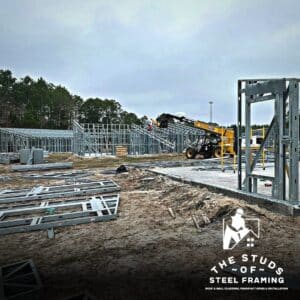Comparing Light Gauge Steel with Traditional Wood Framing: Which is Better?
When it comes to construction, choosing the right framing material is crucial to the longevity, safety, and sustainability of your building. In Florida, where the climate presents unique challenges, the debate between light gauge steel framing and traditional wood framing is particularly important. At Elite Steel, we believe that light gauge steel offers several advantages over wood, especially in terms of durability, environmental impact, and cost-efficiency.
Here’s a detailed comparison between light gauge steel and traditional wood framing to help you make the best choice for your project.
1. Durability and Strength
Light gauge steel is known for its superior strength and resilience. Unlike wood, which can warp, crack, and weaken over time due to moisture and pests, steel is resistant to rot, termites, and other environmental factors. This is especially beneficial in Florida, where the high humidity and frequent storms can accelerate the deterioration of wood-framed structures.
- Steel framing: Stronger and more durable over the long term, with resistance to moisture, pests, and fire.
- Wood framing: While initially sturdy, wood is more susceptible to damage from water, termites, and rot.
For Florida construction, where hurricanes and severe weather events are common, light gauge steel framing provides better protection against wind and water damage.
2. Environmental Impact
Sustainability is a growing concern in the construction industry, and light gauge steel offers clear advantages in this area. Steel is 100% recyclable and can be reused without losing its structural integrity. On the other hand, traditional wood framing contributes to deforestation and creates more waste during the construction process.
- Steel framing: Environmentally friendly due to recyclability and reduced waste.
- Wood framing: Requires cutting down trees and generates more construction waste, though it is a renewable resource when managed responsibly.
For eco-conscious builders, light gauge steel is the more sustainable option, offering a smaller environmental footprint and supporting long-term sustainability goals.
3. Cost and Installation Efficiency
The cost of construction is always a significant factor. While light gauge steel may have a slightly higher upfront material cost than wood, the savings in labor, installation time, and maintenance over the long term make it a more cost-effective choice.
Light gauge steel framing is pre-engineered, meaning components are fabricated to exact specifications and delivered ready for installation. This streamlines the construction process, reduces labor costs, and minimizes errors. Wood framing, on the other hand, requires more time for installation and is subject to warping or twisting, which can lead to additional expenses down the road.
- Steel framing: More efficient installation, reduced long-term maintenance costs.
- Wood framing: Lower initial material costs but higher long-term maintenance and potential repair costs.
4. Fire and Weather Resistance
In terms of fire resistance, steel has a significant advantage over wood. Light gauge steel does not ignite, offering increased safety for both residential and commercial buildings. In Florida, where high winds and the potential for fires are ever-present, having a non-combustible material like steel adds an extra layer of protection.
- Steel framing: Non-combustible, offering better protection against fire.
- Wood framing: Flammable and requires fire-retardant treatments to enhance safety.
For homeowners and builders in Florida, light gauge steel framing is clearly the better option for safety, durability, and sustainability.
At Elite Steel, we provide high-quality light gauge steel framing solutions that outperform traditional wood framing in terms of longevity, strength, and environmental benefits. If you’re interested in learning more about why light gauge steel is the superior choice for your next project, contact us at 1-904-799-6499, or visit elitesteel.com to schedule a consultation.


